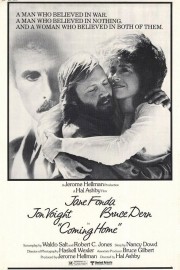Coming Home
“Coming Home” represented an important part in terms of Vietnam, and its aftermath, being presented onscreen. Watching Hal Ashby’s film now, the film’s firm political vantage point, as it empathizes with Luke Martin’s anti-war disillusionment, and how he is supported to finding a way to be whole courtesy of Sally Hyde, feels relatively safe, given how only hardliners now view the Vietnam War in positive terms. The character I find myself having the most empathy for after my first viewing, however, is Capt. Bob Hyde, the career marine who finds it impossible to find stability in real life after he was injured, and returns home. It’s not just the affair his wife Sally had with Luke, though; it’s obvious that what he experienced over in the war left an indelible mark on him that he will never get past. More than Luke’s paraplegic draftee, the title is ultimately about Bob, and how- for a lot of soldiers- coming home wasn’t easy when you felt unease about what your country asked you to do, and you made the choice to enlist.
When the film begins, Luke (Jon Voight) is as damaged in his psyche as he is body- he’s been struggling to acclimate to his injuries, but has found solace with his fellow patients, as they share their hopes and struggles since coming back from war. When we first meet the Hydes, Sally (Jane Fonda) is a straight-laced military wife; her friends are all military spouses, and she understands the responsibility Bob (Bruce Dern) has in going to war. She goes to volunteer at the VA hospital because she’s restless with Bob gone- when her first interaction is with a hysterical Luke, who just needs his urine bag changed, her choice is even more assured. The more she works there, the more her and Luke interact, the more she starts to realize the human toll of the war, and naturally, her views on the way the military treats its soldiers change. When she goes to visit Bob in Japan for a few days, we can tell the change has started; by the time she gets word that he is coming home, her transformation is complete.
The screenplay by Waldo Salt and Robert C. Jones, based on a story by Nancy Dowd, is not terribly complex in the world it paints for these characters, but the emotional landscapes of the characters are profound. This was a pet project of Fonda’s, with Luke inspired by her friend (and fellow anti-war activist) Ron Kovic- whose story was later told in “Born on the Fourth of July- and because of Fonda’s involvement with her production company, its anti-war politics is not surprising. Where the film finds its footing is in how Ashby directs the actors, not just the leads but also supporting characters, like Penelope Milford as Vi Munson (another military wife whose husband is at war) and Robert Carradine as Bill Munson, one of Luke’s friends at the VA, a singer whose wounds from war are deep. When a tragedy strikes Luke, he takes action as an activist for the first time, and it puts he and Sally’s relationship under a more critical lens.
While Sally’s change throughout the film is the one we focus on, and it’s her relationship with Luke that is the heart of the story, every moment we spend with Dern’s Bob is what I cherish the most in this film. In a way, I feel like he is the vet that often got left aside in the anti-war movement, which focused as much on the government’s wanton destruction of the Vietnamese than the impact on the wounded soldiers coming home. I wasn’t alive when my father’s time in Vietnam was over, but I thought about him a lot when considering the role of Bob. He didn’t show signs of PTSD the way Bob did, but the way he looked at war through a generally conservative lens even after the war is what reminds me of him in the character. Ultimately, what sends Bob over the edge is the fact that the government informs him of Sally’s relationship with Luke, and how far it went while he was away. One of the compelling aspects of Sally’s character is how she draws a line in the sand with Luke- which he respects- that she is going to stay with Bob when he comes home. They even tag team to try and get him to calm down after the affair is made common knowledge. His fate is inevitable, because he’s lived in a black-and-white world for so long, he can’t imagine one where he has to live with the things both he, and his wife, have done.
Kino Lorber’s new Blu-Ray of “Coming Home” is a wonderful showcase for the film, the cinematography by the legendary Haskell Wexler (who appears on the disc’s commentary with Voight and Dern), and the soundtrack, which features ’60s and ’70s classics that bring the film’s emotional journey to life. There are also two featurettes and a trailer for the film, but Ashby’s film is the highlight- it’s complicated emotional minefield; the performances by Fonda, Voight (whom share one of the most intimate sex scenes in movie history) and Dern; and its unforgettable ending, which breaks my heart for Bob as much as the rest of the film makes us feel for Luke’s triumph over disillusionment.










